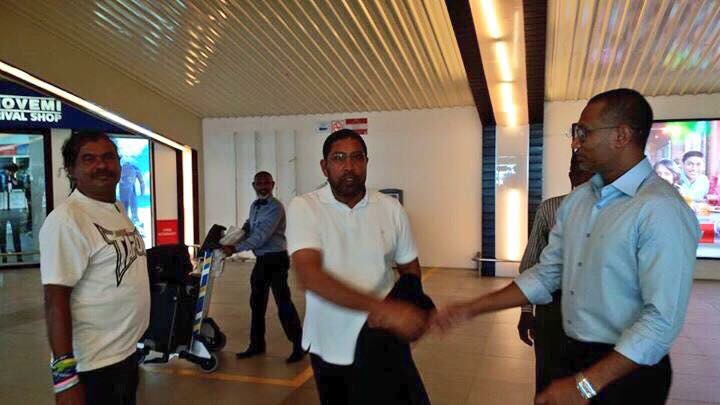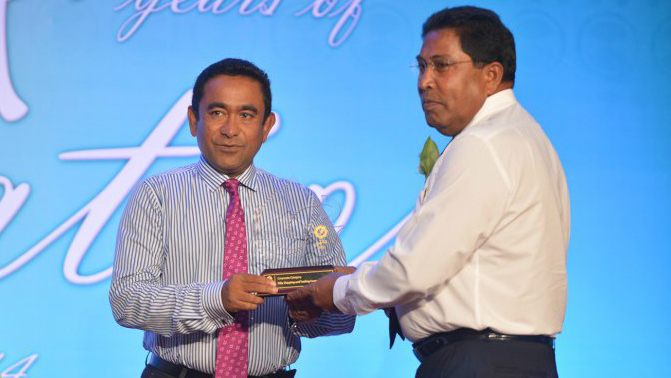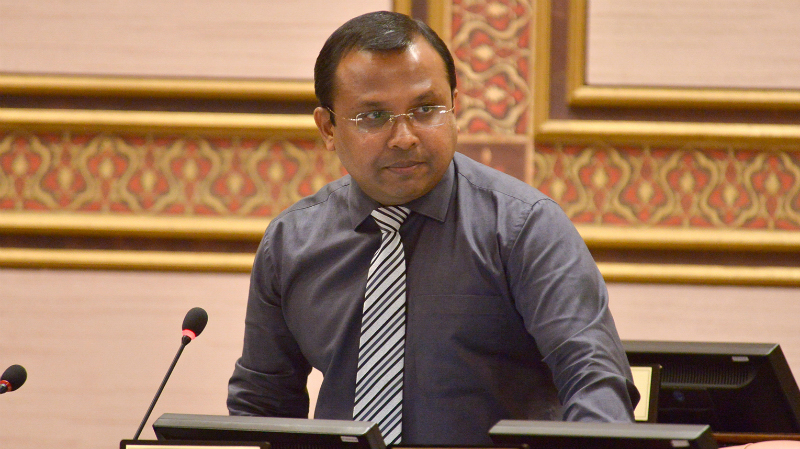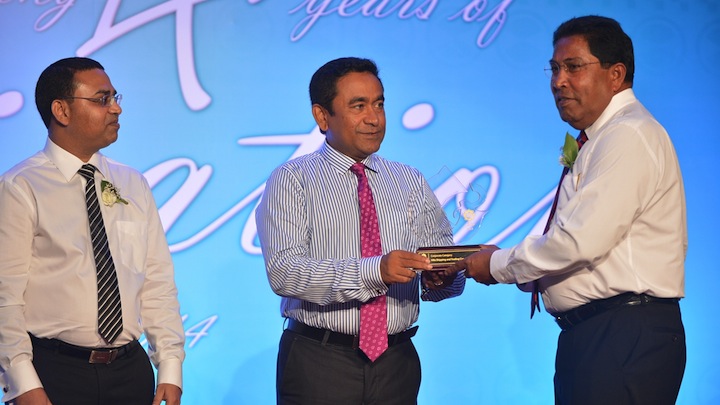The opposition today backed the first amendment to the Maldives Constitution and set new age-limits of 30-65 years for the presidency. The vote is widely perceived as a deal made in exchange for two months of house arrest for jailed opposition leader Mohamed Nasheed.
The ruling Progressive Party of the Maldives (PPM) is seeking to replace vice-president Dr Mohamed Jameel Ahmed, who some MPs have accused of incompetence and disloyalty. Tourism minister Ahmed Adeeb is expected to take over the vice-presidency.
The vote has bitterly divided opposition supporters and leaders.
Opposition Jumhooree Party (JP) MP Ali Hussein said:
Critics say the vote is undemocratic and argue the Constitution is not to be toyed with in the interests of a few. But supporters describe the deal as pragmatic, and claim Nasheed’s transfer to house arrest offers hope of an end to a five-month long political crisis.
The great fall
For some, the amendment is a victory for the opposition as it “eliminates” three strongmen from Maldivian politics; vice-president Jameel, former president of 30 years Maumoon Abdul Gayoom, who is now in his early 80s, and JP leader Gasim Ibrahim, who contested in both the 2008 and 2013 presidential polls, but will be 66 and ineligible in the 2018 election.
Jameel is particularly unpopular among Nasheed’s supporters. He led a religious-nationalist campaign against Nasheed’s Maldivian Democratic Party (MDP) government. In a 2013 campaign speech, he said: “Even if you [Nasheed] are elected, we will not hand over power. You will always remain in prison.”
Here’s one celebratory tweet:
Meanwhile, Gasim’s forced retirement from politics brings many, a great relief. He was a key figure in the fall of Gayoom’s 30-year-dictatorship. Although he backed Nasheed in the 2008 polls, the tourism tycoon played a key role in Nasheed’s ouster in 2012. He then helped Yameen defeat the MDP in 2013.
In January, he allied with the MDP in an anti-government campaign, but abandoned ship when the government slapped a US$90.4million fine on his tourism businesses. The “kingmaker’s” retirement will level the playing field between the two major parties, the PPM and the MDP.
“At the very least, we have been saved from these two,” said an opposition supporter.
If Adeeb is appointed to the vice-presidency, it will undermine the Gayoom family’s hold on power. The PPM had, in fact, backed the amendment against Gayoom’s wishes. The former president, who also heads the PPM, said last week: “There is no point to a man whose opinions are of no value staying on as PPM president.”
Gayoom’s son, MP Faris Maumoon, was absent from today’s vote.
President Yameen, as Gayoom’s half-brother, was elected on his popularity and Gasim’s backing. But in the past 18 months, he has created his own power base, with hand picked MPs and ministers. His right-hand man is tourism minister Adeeb.
New political actors
Why the sudden drive to replace the vice-president? PPM MPs have said Jameel is incompetent. But the opposition claims Yameen is fatally ill and is seeking a loyal deputy ahead of a major surgery. It is precisely Adeeb’s rise to power that some opposition supporters fear. He has been accused of massive corruption and illicit connections with gangs. Why tamper with the Constitution to bring an unelected minister to power?
Azim Zahir, a political science student at the University of Sydney, said: “This amendment is clearly undemocratic as its objectives are to ultimately negate the democratic impulse behind giving the people a direct say in the election of a vice-president and also negates the electoral wish of a majority in 2013.
“It allows changes to the constitution at the wish and whim of the government of the day, and in this case that wish is to appoint as vice-president, a politician perceived as highly corrupt and suspected in egregious crimes such as torching of TV stations, and abduction of journalists.”
But one opposition MP asked how today’s vote had been undemocratic:
Aishath Velezinee, a whistle-blower and former member of the judicial watchdog, said: “The problem is not the substance of the constitutional amendment, but the manner and purpose of that amendment.”
Fuwad Thowfeek, the former Elections Commissioner, agreed: “As a matter of principle, I don’t believe that anyone should support a change in any article of our constitution for the personal gain of anyone or any party.”
Supporters of the vote, however, say Adeeb is and will continue to run the show with or without the constitutional amendment. Although there have been no changes to the letter of the Constitution until today, the parliament and the Supreme Court have violated its spirit with the dismissal of the Auditor General, the guidelines for the elections commission and the human rights watchdog, and the dismissal of the Chief Justice.
Honor the deal?
More pressing are the following questions: Will the government honor its promise and keep Nasheed under house arrest? Why didn’t the opposition demand Nasheed’s unconditional release? Was a constitutional amendment worth eight weeks of house arrest?
What kind of precedent are we setting if we allow the government of the day to hold opposition leaders to ransom for votes?
Previous political compromises have not worked out well for the MDP. For instance, in 2010, the MDP reached a compromise on appointments to the Supreme Court and the appointment of unqualified judges to the judiciary. Those same judges sentenced Nasheed and other opposition politicians to jail this year.
In 2013, Nasheed and the MDP accepted the findings of a Commonwealth-backed inquiry that the 2012 transfer of power was constitutional. The lack of accountability for the unlawful transfer of power haunts the Maldives to this day. Isn’t it high time the MDP learnt from its mistakes?
But, opposition supporters say the MDP was forced to compromise then and now due to the political reality of the day. Although the MDP is the largest political party, it continues to face a hostile parliament, judiciary and security forces. Democracy is won through hard compromises and dirty deals.
Supporters say a deal is necessary as President Yameen has refused to back down despite the mounting diplomatic pressure, the daily protests and the historic marches of February 27 and May 1.
“To free a man held by a terrorist organization, you must make a deal. You cannot argue on legal principles,” said Mujthaba Saeed, an MDP member. “I do not trust the government. They might take Nasheed back to jail at any moment. But what we are trying to do is to find a path forward from a slim chance.”
Hope
Many of Nasheed’s supporters say his release alone will energize and reinvigorate the opposition’s campaign. They also hope that the government will compromise further by dropping charges against hundreds of protesters and free jailed leaders.
“We are incapacitated to stand up for ourselves without this one unique single person who inspires us. I selfishly want to see Nasheed free because all hope for freedom of expression and right to assembly are weakening day by day when Nasheed remained in jail. Less and less people turn up to protest. But today, it just seems more alive, people are talking about this, people care, There is hope,” said Ifham Niyaz.
Others have called for soul-searching. “Sell your votes in every election. Stay at home and criticize every move? Have you no shame?” asked one supporter. Another said: “It is Nasheed who must rot in jail. It is Nasheed who must protest on the street. But I, I will stay home and tweet.”
The disappointment has led still others to call for a new political ideology and new political leaders. But who will that be? Azim, the PHD student at Sydney University said: “I don’t know. I’m just saying democratic, utopian energies and hopes have been exhausted. Current times, crises, open up for new possibilities and new people. I just wish there could be such visions and such people and such parties. I suspect many people share these same sentiments, but this may not be sufficient enough for a change within the next five years.”
Transparency
Some opposition supporters have censured critics for the storm of criticism against the MDP for choosing a deal. “Where were all these critics when MDP was alone on the streets?” asked one Twitter user.
“No one had an opinion when the constitution was raped by Gayooms so that they could come back. Even now, the only point they want to discuss is MDP cutting a deal,” said photographer Munshid Mohamed on Facebook. In reply, his friend said: “If Gayoom’s and PPM actions are the standard for our commitment to democracy, then we’ve lost before we even started.”
For many, this is the sticking point. They expect better of MDP. The party in January had urged the public to follow it in a campaign to defend the constitution. But today they voted to amend the same constitution.
“I thought about it, I can’t agree with the MDP. If this is pragmatism – then so is the guy who sells his vote for an Air Conditioning unit,” said blogger Yameen Rasheed.
One thing is clear. The people deserve to know more. If the government and the opposition are making deals, it must be through open and transparent negotiations. MDP stands more to lose than any other party with the current opacity. As a party that stands for democracy, it cannot ask its supporters to blindly trust all of its decisions.
Likes (7)Dislikes
(7)Dislikes (0)
(0) 




